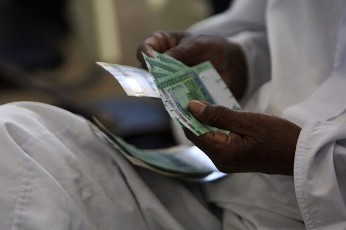Sudan currency falls to new lows as government sounds warning bell on spending
December 2, 2012 (KHARTOUM) – The Sudanese pound marked a record low on Sunday in the black market dealing a fresh blow to government’s efforts to bring stability to the foreign exchange market which has yet to recover from the impact of South Sudan’s secession.
 The development comes less than two weeks after the Bank of Sudan (BoS) announced that it has received a “large” deposit of hard currency from an unspecified source.
The development comes less than two weeks after the Bank of Sudan (BoS) announced that it has received a “large” deposit of hard currency from an unspecified source.
On Sunday, a dollar bought 6.5 pounds on the black market compared with 6.3 a week ago. This is the lowest rate since the Sudanese pound was introduced in 2007 and also well below the official rate of around 4.4.
Sudan has already took the long avoided step of devaluing the currency last July to bring official rate in parity with the black market.
Traders told Reuters that there is a shortage in dollars and said they expect the rate to reach 7 pounds to the dollar by year end.
A deal between Khartoum and Juba last September over oil transit fees renewed hopes that Sudan will soon get a stable supply of hard currency once oil production is resumed.
But recent hurdles that emerged as a result of Khartoum’s insistence that security arrangements are agreed on with Juba before oil can start flowing again, dashed hopes in the market that the dollar shortage will be resolved anytime soon.
South Sudan was scheduled to resume oil production on Nov. 15 with the first exports to hit markets by January.
In response to the worsening exchange rate situation the finance ministry said today that it expects to receive $1.5 billion in foreign currency before month end.
But similar announcements made by the government over the course of this year did little to quell the exchange crisis. Some observers in Sudan even went as far as questioning the truth of hard currency deposits the central bank says it is receiving.
A meeting of the leadership council at the ruling National Congress Party (NCP) today tackled this issue and affirmed the need to preserve the exchange rate.
The NCP deputy chairman Nafie Ali Nafie told reporters that stabilizing the exchange rate and balancing the budget is an economic priority for the government.
In a related issue the finance ministry renewed its call for lifting subsidies on petroleum products for the sake of helping the poor.
The Undersecretary of the finance ministry Youssef Abdullah Al-Hussein went on to say that the country’s national income falls short of maintaining the government’s functioning.
“There are ministries if we allocate the entire budget to it would not be sufficient,” Al-Hussein said at the national assembly.
He also complained about government agencies not abiding by austerity rules implemented this year including the “parliament itself”.
The official revealed that they sent a letter to the council of ministers barring the travel of any constitutional post holder and accused unnamed parties of circumventing this rule through travel agencies. The latter he said are flying officials “on credit” and bills would be settled later through public funds.
The finance minister Ali Mahmood speaking at the national assembly as well said that the 2013 budget faces a number of constraints such as natural disasters, political events, diseases and sanction. He announced that new buildings would no longer be authorized including ones planned at the defense ministry.
The east African nation was almost totally reliant on oil exports which provided the bulk of its national income and foreign currency inflows fueling an economic boom that followed the end of a two-decade long civil war.
After years of a robust economic growth including double-digit figures, Sudan witnessed an economic contraction in 2011 as a direct result of the country’s breakup.
Last April, the IMF projected a -7.3% GDP contraction in Sudan for 2012 but in October the world financial institution changed that number to -11.2%.
(ST)
